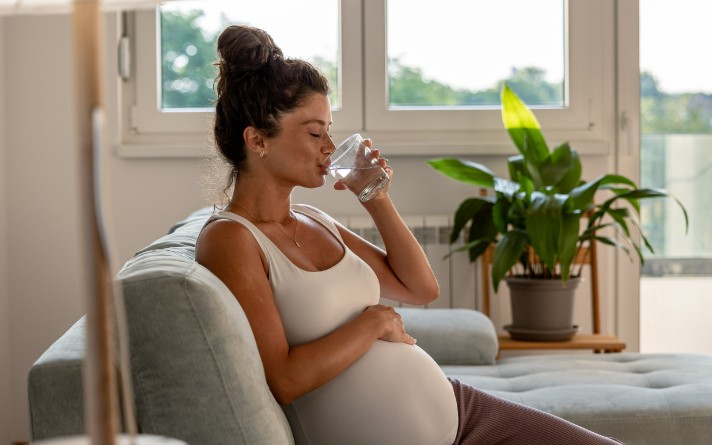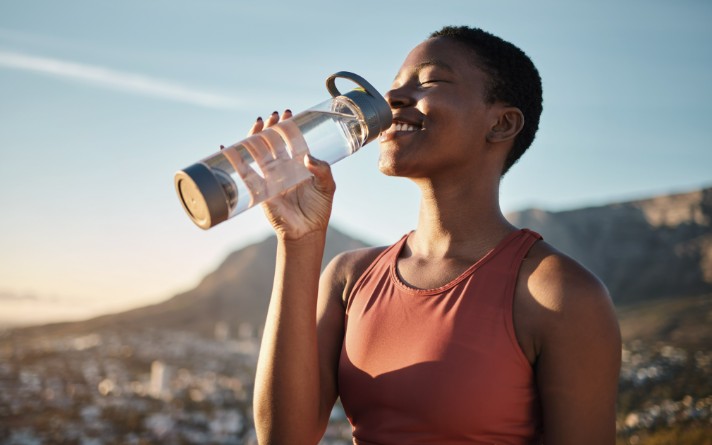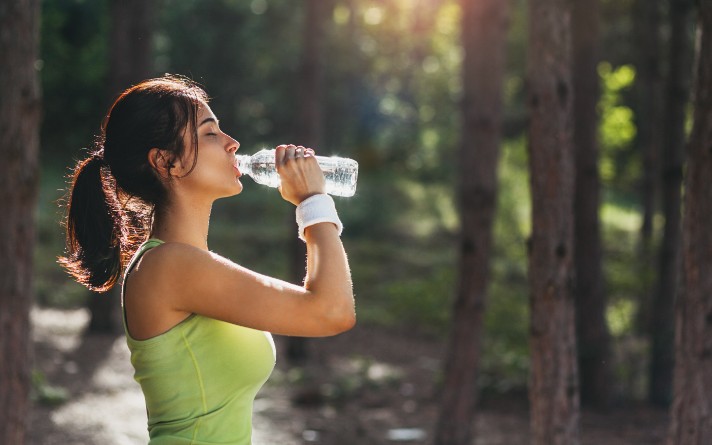When you go through pregnancy your body will require more food and water to help sustain the growth of your baby.
This is why it’s crucial to stay hydrated when you’re pregnant.
If you have a regular exercise routine then it will be even more important to ensure you’re getting the right amount of fluids into your body.
In this article, we will cover the importance of staying hydrated during pregnancy as well as how to do so.
Let’s get into it.
How can you stay hydrated during pregnancy?

Staying hydrated during pregnancy is crucial for both your health and the health of your baby. Here are some tips to help you stay hydrated:
- Drink plenty of water – Aim to drink at least 8-10 glasses of water each day. Keep a water bottle with you throughout the day to remind yourself to drink regularly.
- Incorporate hydrating foods – Many fruits and vegetables have high water content, such as watermelon, cucumber, oranges, and strawberries. Eating these foods can contribute to your overall hydration.
- Drink electrolyte-rich beverages – Electrolyte drinks or coconut water can help replenish electrolytes lost through sweat, especially if you’ve been exercising or experiencing morning sickness.
- Monitor your urine – Pay attention to the colour of your urine. Clear or pale yellow urine generally indicates good hydration, while dark yellow urine may indicate dehydration.
- Sip fluids throughout the day – Rather than trying to drink large amounts of water all at once, sip fluids steadily throughout the day to maintain hydration levels.
- Stay cool – Avoid overheating, especially in hot weather. Use fans or air conditioning to stay cool, and wear lightweight, breathable clothing.
Check out our pregnancy workout here and maintain your fitness throughout your pregnancy with POW8R.
How much water should a pregnant woman drink?

The recommended amount of water for a pregnant woman can vary depending on factors such as age, weight, activity level, climate, and overall health.
However, a general guideline is for pregnant women to aim for about 8-12 glasses of water per day.
Although, it’s important to listen to your body and drink water whenever you feel thirsty.
How do you know if you are dehydrated in pregnancy?
Here are some signs and symptoms to watch for:
Dark urine
If your urine is dark yellow or amber in colour, it’s often a sign of dehydration. In a well-hydrated state, urine is usually pale yellow or almost colourless.
When you’re dehydrated, your body conserves water by reducing the amount of urine produced.
However, it’s important to note that dark urine can also be caused by other factors such as certain medications, vitamins, or foods.
Therefore, it’s essential to consider other symptoms of dehydration along with the colour of your urine when assessing your hydration status.
Dry mouth and lips

Feeling constantly thirsty and having dry mouth and lips are common signs of dehydration.
When your body doesn’t have enough water, it can’t produce enough saliva, which leads to a dry sensation in your mouth.
Similarly, dehydration can cause your lips to become dry and cracked.
It’s essential to drink enough water throughout the day to stay hydrated and avoid these symptoms when pregnant.
Fatigue and dizziness
Dehydration can lead to feelings of fatigue, dizziness, or lightheadedness. You may also experience headaches or difficulty concentrating.
When you’re dehydrated, your body doesn’t have enough fluid to perform its normal functions efficiently, which can lead to feelings of fatigue and lightheadedness or dizziness.
Staying properly hydrated is important to help prevent these symptoms and maintain overall well-being, especially when pregnant.
Constipation
Dehydration can lead to constipation, which is common during pregnancy.
If you’re experiencing infrequent bowel movements or difficulty passing stools, it may be a sign that you need to increase your fluid intake.
Your body may pull water from your stools to compensate for the lack of hydration, resulting in harder, more difficult-to-pass stools.
Ensuring you drink an adequate amount of water can help keep your digestive system functioning properly and prevent constipation.
What happens if you don’t drink enough water while pregnant?

It’s extremely vital that you stay as hydrated as possible when pregnant. Hydration levels can influence the development of your baby.
A study conducted in 2023 showed that insufficient fluid intake levels during pregnancy are believed to be associated with spontaneous abortions, preterm births, and foetal malformations.
If you are trying to stay hydrated and feel that it isn’t adequate then it’s important to consult with a health professional.
Why is hydration so important in pregnancy?
Here are several reasons why hydration is essential during pregnancy:
Supports Fetal Development
Hydration is necessary for the development of the placenta and the amniotic sac, both of which are vital for the growth and nourishment of the foetus.
Studies have proven that hydration during pregnancy is requisite to sustain the balance of amniotic fluid, which is vital to maintain foetal well-being.
Regulates Body Temperature

Pregnant women are more prone to overheating due to hormonal changes and increased metabolic rate.
Staying hydrated helps regulate body temperature and prevents overheating, which can be harmful to both you and your baby.
Elevated body temperature, particularly during the first trimester, can increase the risk of certain birth defects and developmental issues in the foetus.
Supports Breastfeeding
After childbirth, hydration remains essential, especially for breastfeeding mothers.
Proper hydration supports milk production and helps maintain adequate milk supply for the newborn.
Breast milk is composed primarily of water, so staying hydrated is crucial for maintaining milk production and providing the necessary fluids for your baby.
Prevents Preterm Labour
Dehydration can trigger contractions and increase the risk of preterm labour.
Preterm labour refers to labour that begins before the 37th week of pregnancy.
A full-term pregnancy typically lasts around 40 weeks, so preterm labour occurs when contractions and cervical changes begin earlier than expected.
Minimises the risk of Urinary Tract Infections (UTIs)
Pregnancy increases the risk of UTIs due to hormonal changes and pressure on the bladder from the growing uterus.
Drinking plenty of water helps flush bacteria out of the urinary tract and reduces the risk of infection.
Staying hydrated can also help prevent the buildup of concentrated urine, which can create an environment conducive to bacterial growth and increase the risk of UTIs.
Helping You Keep Fit and Hydrated During Pregnancy
It’s clear to see that staying hydrated during your pregnancy is not only necessary but extremely beneficial.
Luckily there are so many ways to keep yourself hydrated during pregnancy which means it shouldn’t be an issue if you make a conscious effort to stay hydrated.
At POW8R we help women during pregnancy and post-pregnancy to stay in shape and keep fit.
With hundreds of in-demand workouts available on our app, we have plenty of exercise routines to suit you.
Just ensure that you’re taking in enough liquid throughout the day when you work out with POW8R.
Check our site and see what membership level suits you.
